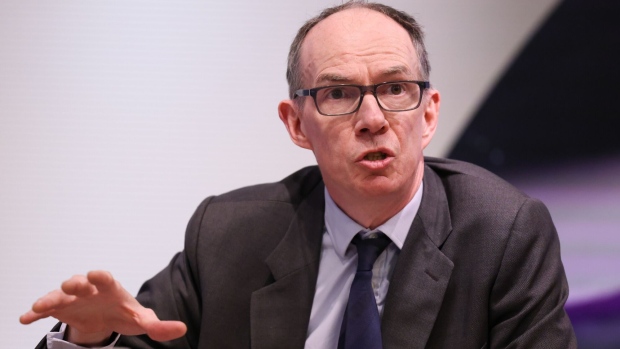Apr 19, 2024
BOE’s Ramsden Signals He Has Less Concern About UK Inflation
, Bloomberg News

(Bloomberg) -- Bank of England Deputy Governor Dave Ramsden signaled he is less concerned about UK inflation than in previous months, a sign he may be willing to support interest rate cuts.
Ramsden played down concerns of the UK seeing a US-style uptick in price growth, arguing that its inflation dynamics are now “converging” with the more sanguine backdrop in the eurozone.
“UK CPI inflation in March was below US CPI inflation, and the April data is very likely to show the UK converging in line with euro area inflation,” Ramsden said Friday in the text of a speech he delivered in Washington. “This leaves the UK as less of an outlier and more of a laggard in terms of recent inflation performance.”
The remarks highlight a shift both for the UK and Ramsden. Britain last year suffered higher and more persistent price pressures than the US and eurozone, leaving the BOE on guard against easing up on the highest interest rates in 16 years. Now that those pressures are subsiding, Ramsden, a relatively hawkish member of the BOE’s rate-setting panel, is sounding more relaxed.
The official noted that sharp falls in the Consumer Prices Index since the autumn have put UK inflation on track to meet the BOE’s 2% target in April’s data. He also said he’s more confident that domestic pressures are “receding.”
His dovish tone on inflation echoes that of Governor Andrew Bailey earlier this week and triggered further bets on rate cuts. It also may feed economists’ expectations that a summer rate cut is still in play.
Markets have pushed back their bets on a policy loosening soon in recent weeks, tracking a retrenchment of rate cut wagers in the US after surprisingly strong inflation there. But after Ramsden’s remarks on Friday, traders moved to fully price in two quarter-point rate cuts by the end of this year. At the start of the day, they were only certain about one.
Asked after the speech about the need to stay close to the Fed’s policy path, Ramsden highlighted the BOE’s recent record of moving before the US central bank on hiking rates and quantitative tightening. He also said the market may still have lingering concerns over the persistence of inflation in the UK, something he is becoming less worried about.
The European Central Bank is preparing investors for a cut in June, while Federal Reserve Chair Jerome Powell this week said the US is taking longer than expected to get inflation back to target.
Ramsden said that the risks to UK inflation from domestic pressures are now more tilted to the downside compared to the BOE’s February forecasts. He added that the “labor market has clearly continued to loosen” and that restrictive monetary policy is bearing down on inflation, including on the sticky prices seen in the services sector.
He doubled down on Bailey’s efforts to get markets to view UK inflation dynamics as more akin to the eurozone’s than those in the US. Bailey said on Tuesday that there is “strong evidence” of easing price pressures and distanced the UK from the “demand-led” inflation uptick seen across the Atlantic.
Their comments come after a raft of slightly stronger wage and price data in the UK this week that added to investor concerns of it suffering a similar resurgence in inflation.
Regular wage growth eased only slightly to 6%, well higher than levels that the BOE sees as consistent with its price growth target. Inflation was also stronger than expected at 3.2%, though economists expect it to fall sharply to around 2% in April’s data because of a slump in energy bills.
--With assistance from Philip Aldrick and Greg Ritchie.
©2024 Bloomberg L.P.






